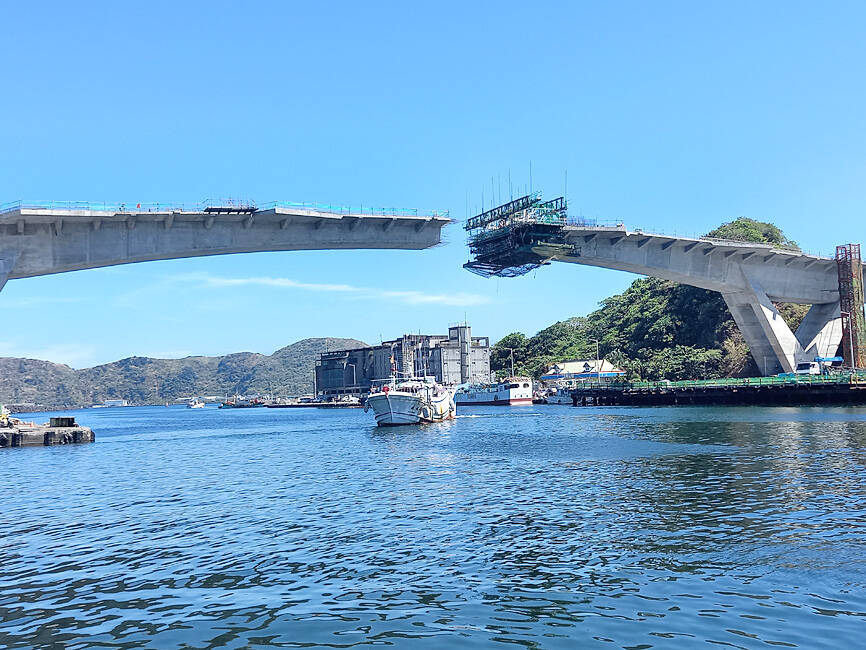The Yilan District Prosecutors’ Office on Monday charged six people with negligence over the October 2019 collapse of the Nanfangao Bridge (南方澳橋) that killed six people and injured 12.
Four of the defendants are from companies contracted to oversee the bridge’s construction and supervision, while two are former officials in charge of construction at the Suao Port Branch of Taiwan International Ports Corp.
They have been charged with involuntary manslaughter and negligent injury, the prosecutors’ office said.

Photo: Chiang Chih-hsiung, Taipei Times
It said the collapse was the result of collective negligence by the defendants.
The contractor did not build the 140m suspension bridge according to the approved blueprint, the supervisory company failed to perform its job properly and the port management authority failed to conduct controls, maintenance and repairs as required, it said.
The contractor covered cables with loose-fitting high-density polyethylene tubes that did not attach to bridge anchor heads in an airtight manner, it said, adding that the anchor heads were not shielded against water.
As the waterproofing material on the anchor heads wore off, saltwater corroded the cables and joints inside, it said.
The office also charged the owner and a shareholder of the supervisory company with forging documents and fraud, after they were found to have hired unlicensed personnel to inspect bridges in Yilan County.
The company in 2018 illicitly gained NT$8.23 million (US$270,412 at the current exchange rate) in public funds by providing false information about inspectors to the Yilan County Government, prosecutors said.
The finding was made during the probe into the collapse and is not related to the incident, they said.
The corrosion issue was mentioned in a report by the independent Taiwan Transportation Safety Board in 2020.
Bureau official Yeh Ming-shan (葉名山) at the time said the bridge was prone to rust damage, due to saltwater and high humidity in the area.
Rain water also seeped into the anchoring mechanism and corroded the steel strands, he said.
The bridge underwent seven inspections since its completion in 1998, but they were all superficial visual inspections that failed to take into account that the bridge had specific design features that required closer examination, Yeh said.
No inspection had been carried out in the four years prior to the collapse, he added.

The Grand Hotel Taipei on Saturday confirmed that its information system had been illegally accessed and expressed its deepest apologies for the concern it has caused its customers, adding that the issue is being investigated by the Ministry of Justice Investigation Bureau. The hotel said that on Tuesday last week, it had discovered an external illegal intrusion into its information system. An initial digital forensic investigation confirmed that parts of the system had been accessed, it said, adding that the possibility that some customer data were stolen and leaked could not be ruled out. The actual scope and content of the affected data

DO THEY BITE IT? Cats have better memories than people might think, but their motivation is based entirely around the chance of getting fed Cats can remember the identity of the people who fed them the day before, Taipei-based veterinarians said on Friday, debunking a popular myth that cats have a short memory. If a stray does not recognize the person who fed them the previous day, it is likely because they are not carrying food and the cat has no reason to recognize them, said Wu Chou Animal Hospital head Chen Chen-huan (陳震寰). “When cats come to a human bearing food, it is coming for the food, not the person,” he said. “The food is the key.” Since the cat’s attention is on the food, it

A New York-based NGO has launched a global initiative to rename the nation’s overseas missions, most of which operate under the name "Taipei," to "Taiwan Representative Office (TRO)," according to a news release. Ming Chiang (江明信), CEO of Hello Taiwan, announced the campaign at a news conference in Berlin on Monday, coinciding with the World Forum held from Monday through Wednesday, the institution stated in the release. Speaking at the event, Democratic Progressive Party Legislator Huang Jie (黃捷) said she believed this renaming campaign would enable the international community to see Taiwan

TOO DANGEROUS: The families agreed to suspend crewed recovery efforts that could put rescuers in danger from volcanic gases and unstable terrain The bodies of two Taiwanese tourists and a Japanese pilot have been located inside a volcanic crater, Japanese authorities said yesterday, nearly a month after a sightseeing helicopter crashed during a flight over southwestern Japan. Drone footage taken at the site showed three bodies near the wreckage of the aircraft inside a crater on Mount Aso in Kumamoto Prefecture, police and fire officials said. The helicopter went missing on Jan. 20 and was later found on a steep slope inside the Nakadake No. 1 Crater, about 50m below the rim. Authorities said that conditions at the site made survival highly unlikely, and ruled